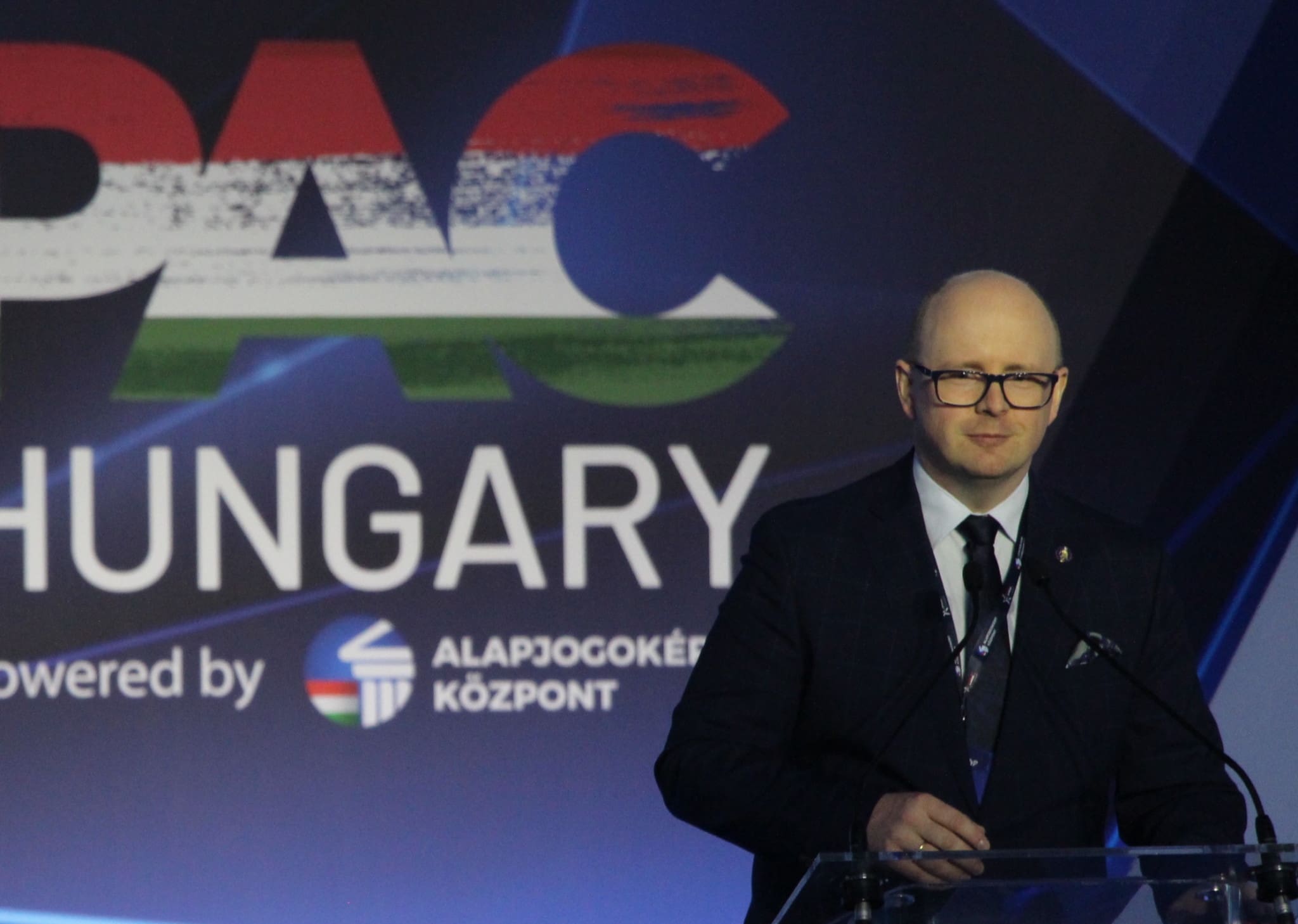As a lawyer and the chairman of Ordo Iuris, the Polish lawyers’ organization, I know you for being very good at giving definitions. Could you define this woke ideology everybody talks about at CPAC Budapest? I heard you talk of “totalitarian woke” during your speech…
The best definition was in fact given yesterday by Prime Minister Orbán who talked about different variants of the same virus of neo-Marxist ideologies threatening the roots of our civilization, wokeness being all those new variants of neo-Marxism like gender ideology, LGBT ideology, and the pressure to limit freedom of speech and freedom of academic research. These are now threatening the foundations of what was called once Latin civilization or Judeo-Christian civilization, which was based on human dignity, individual freedoms, and basic unalienable rights and liberties, creating an environment for the pursuit of individual happiness. This was inscribed in the preamble of the American Constitution, but in fact was taken from a very European, very Christian, and very Thomistic philosophy. Wokeness is everything that is built up today to negate those foundations and to build up a new society and a new man with a utopian totalitarian state.
So, you are saying wokeism is a kind of neo-Marxism, right?
Yes, because it brings this promise of everlasting peace and everlasting happiness for everybody. And as we know as Christians, those promises will not be fulfilled on Earth.
So, I understand that what we call gender theory or gender ideology is part of wokeism. Can we say it’s like a branch of wokeism?
It’s part of wokeism because wokeism being the newest variant of the Marxist virus aims to segregate and divide societies and then to give them class identities, provoking war between those class identities in order to give the power to those who are expressing the volonté générale, those who are self aware of the situation. So yes, it is going back of course to Marxism, it is going back to Jean-Jacques Rousseau, it is going back to the very roots of the liberalism that threatened classical Christianitas, which was a union, not a division of all the peoples.
During your speech here at CPAC Hungary, I heard you talk about the new rights linked to this new ideology, and you mentioned the right to abortion and the right to transition to another “gender,” i.e., a new sex. About abortion, I know many Western European conservatives or self-claimed conservatives who think abortion is a right. So, what can you tell them?
From the legal point of view, not a single international human rights treaty or document declares abortion to be a right. Because if there is a right, there is an obligation of others to provide you with abortion, and there is no such obligation and no right to abortion. Of course, separate countries may enact these kinds of provisions in their laws on their own soil, but on the human rights level, there is no right to abortion. But at the same time, there is a right to life, there is a legal international protection of life, and many countries — in fact, a majority of countries — interpret those provisions of the international human legal system to include also the life of a human being before birth, i.e., the life of the human being at the stage of fetal development.
Poland is among those countries. And in the world, most African countries, countries in the Americas, and many other countries follow the same traditional approach that was also shared by the authors of the human rights treaties in the 1950s and 1960s, who clearly wanted to include unborn life in the protection of life as well.
Today, of course, we know that it is challenged by many countries. There is especially a European-centric approach that wants to challenge this protection of life, but it is a slippery slope if we grant power to the state to exclude anybody from the general and universal protection of life, because then the state would be under pressure to exclude the next groups and then the next groups, and then again the next groups, etc.
And, of course, next come the elderly people or the ill people who are the candidates for euthanasia, and maybe even against their will, which we know is happening in some countries. And then other groups as well may be deprived of those fundamental guarantees.
So, your message to Western European conservatives would be: If you want to reverse this trend, if you want a real counter-revolution, you have to go back to the beginning of this slippery slope…
You have to go back to the beginning, meaning to the natural law. And it was the idea of the authors of the Universal Declaration of Human Rights, it was the idea of Jacques Maritain to prepare a document that would be a catalog of unalienable natural rights for which there was the broadest consensus, a global consensus of all countries, all nations of the world. And it was the Universal Declaration of Human Rights, and of course the right to life, the right to marriage of a man and a woman, the right to private property, freedom of speech, freedom of conscience, and basic political freedoms. It is a very selected set of unalienable rights and, if we want to have a strong human rights system, we need to stick to this set.
As we are broadening the scope of human rights, we are trying to create and implement new human rights, and then there is no global consensus. What’s more, the new human rights trample over old human rights. The right to be protected against hate speech tramples over freedom of speech. The right to abortion tramples over the right to life, and so on and so on.
How do you explain the fact that the EU, the institutions of the European Union, are on one side of this conflict of rights? They actively promote the right to abortion, although the regulation of abortion is not a competency of the EU. They promote “LGBT rights.” Why?
It is just the political choice of the bureaucrats and of the few elected politicians that are in the European, Union — as most of them are not elected by the general public — to promote ideas and ideologies that they believe will be supportive for their political careers. But of course, they are doing it outside of the boundaries of the powers of the European Union. The EU has very strictly written boundaries of its powers in the treaties, and abortion is outside of that, of course, as is family law. So, the definition of marriage, in many countries of the European Union, is still a traditional definition of marriage, as it was in the Universal Declaration of Human Rights, which means that a man and a woman form a marriage. And it is outside of the scope of the powers of the European Union to dictate anything else to the member states. It is even against its own motto: “United in diversity.”
We often raise this issue that we are diverse, that Central European countries do differ. We have a different traditional approach. We have our own constitutional identities. They may be different than those of Western countries, and we have to respect each other. We do not want to set the internal laws of Spain or France, but we do not want them to get involved in our internal issues either.
We often hear that all this conflict, which has been going on for years about the rule of law and European values — which European values? — is actually a conflict with countries, mostly Poland and Hungary, that are still attached to this traditional definition of human rights.
This traditional definition of human rights is a definition of the rule of law. If anybody transgresses the definition of human rights, they in fact violate the rule of law. From our perspective, it is the Western countries that violate the rule of law by allowing children in the womb of their mothers to be killed, by allowing elderly people to be killed, and by other actions or omissions that from our point of view are atrocities against the human rights system.
But there is another side to this story as well. When I was speaking to members of the European Judicial Network a few years ago, just after our judiciary reforms were started in Poland, they clearly expressed their opinion that even though Poland is implementing solutions very similar to the Germans or Spanish, we are not entitled to do so because Spain and Germany are old democracies with a tradition of democracy and we are new democracies and need a higher level of formal guarantees. Of course, such differentiation is nowhere to be found in the treaties. In the treaties, all the member states are equal. And if we are going to delve into history, then we can ask the question of who has an older democracy in Europe — France or Poland, Spain or Poland — and Poland will probably win this competition.
It seems to me that at the international level, the EU is not the only threat to real human rights. Ordo Uris has been alerting about the World Health Organization, about its gender ideology, the WHO recommendations for sexual education in Europe dating back to 2010, and now there is this new draft anti-pandemic treaty. So do we also have a problem with the World Health Organization?
We do have a problem with the World Health Organization, and we do have a problem with the United Nations and all its agendas. It is a very similar problem to the problem with the European Union: They all have the same virus of wokeness, the same virus of global management. Those are the same elites and even the same people involved in all those institutions around the world, unelected people without any democratic legitimization of their power. However, at their disposal are the many billions of dollars poured into international organizations and their tremendous power over sovereign states.
At the same time, their approach to the world’s diversity is a top-down approach of a global manager who wants to control everything everywhere, believing that he has the best solution for everyone. As all businessmen know, especially the successful ones, to have one solution for everything is a short path to disaster.
What we propose to the WHO and to the U.N. is to go back to the documents, their founding documents, and to realize that they should be facilitators of regional growth, of regional solutions, and not global managers.
Unfortunately, they are doing something absolutely different with this pandemic treaty or pandemic amendment that is now being negotiated in the WHO. They would like to have new powers over sovereign states. In short, they would like to implement lockdowns, to implement pandemic measures without consent of the sovereign governments or sovereign parliaments. In fact, most of our sovereignty would be given to the WHO when it announces that there is a pandemic, which is something absolutely impossible to agree upon. However, they are taking advantage of the fact that many countries in the world are not aware of the danger of these kinds of solutions at the international level. They want more and more power and then they will be asking for more and more money and then there will be more and more global management and more and more local disasters.
Could you tell us what is the action of the Polish lawyers’ organization Ordo Iuris at the international level, at the U.N., the EU, and elsewhere?
It is now the 10th anniversary of Ordo Iuris, and since 2016, we have had an official consultative status at the United Nations. So, our lawyers and experts are often guests during U.N. committees and in working groups dealing with different issues, and very often they are the only voice that reminds people about unalienable rights and the Universal Declaration of Human Rights. It is very important because, on this level, there is need for universal consent. If there is any opposition, then the dialogue will continue. So, our role very often is to show representatives of many countries that there are traditional conservative countries, that they do have the support of lawyers, of some professionals in Europe. This is very important, especially for the countries of the southern hemisphere. And we are doing very similar work in Europe, in the Council of Europe, in international tribunals like the European Court of Human Rights and the European Court of Justice, and sometimes even in constitutional courts of different nations when they are considering cases that are important for basic human rights.






